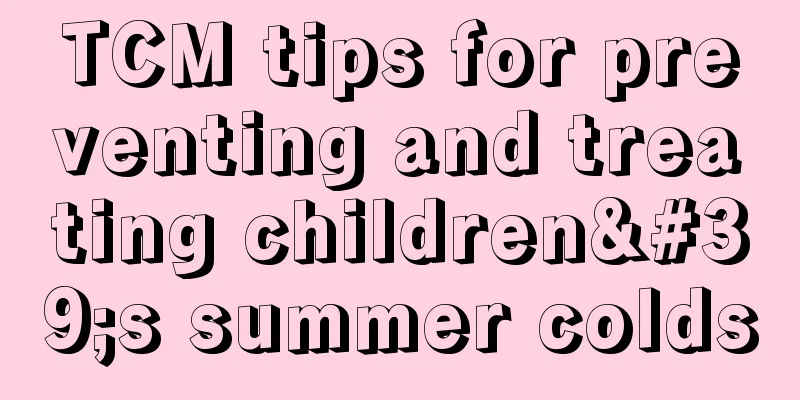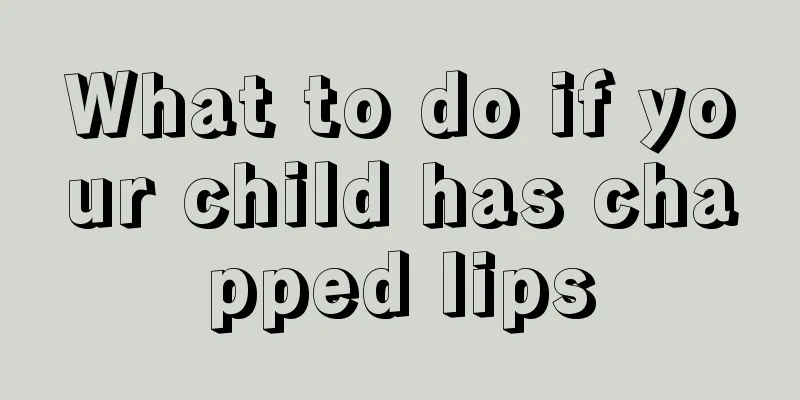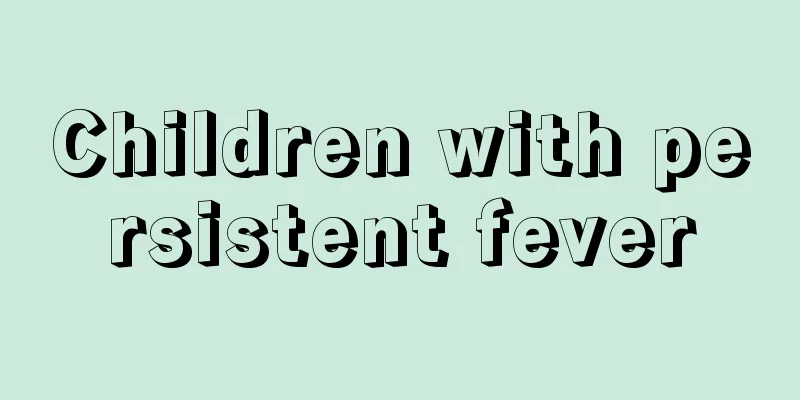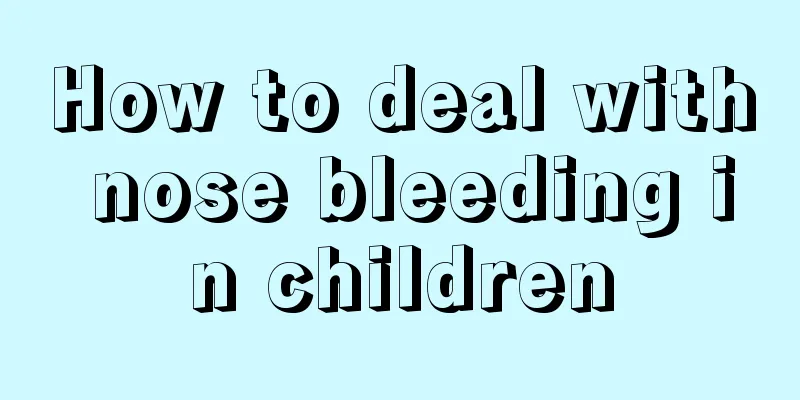TCM tips for preventing and treating children's summer colds

|
A cold is a general term for upper respiratory tract infections. Inflammation of the upper respiratory tract caused by various pathogenic microorganisms is collectively called upper respiratory tract infection. If the inflammation occurs in a single part, it is called rhinitis, nasopharyngitis, tonsillitis, pharyngoconjunctival fever, epiglottitis, and laryngitis. There are many pathogenic microorganisms that cause upper respiratory tract infections, which are mainly transmitted through respiratory droplets and direct contact. Children are generally susceptible and often get infected repeatedly. Viruses account for about 90% of the infectious factors, and others include bacteria, mycoplasma, chlamydia, etc. Common viruses include rhinovirus, coronavirus, influenza virus, parainfluenza virus, respiratory syncytial virus, coxsackievirus, etc. Common bacteria include streptococci, pneumococci, staphylococci, etc. Because the temperature is relatively high in summer, being thirsty and drinking a lot can easily cause water retention in the body, which can turn into heat; children sweat a lot, which consumes energy; the humidity is relatively high, which reduces appetite and affects eating; the days are long and the nights are short, and it is hot and stuffy, which leads to lack of sleep. These factors will reduce children's resistance and make them more susceptible to external pathogens. From the perspective of external factors, children tend to be greedy for cool drinks, such as turning on the air conditioner, drinking cold drinks, eating ice cream, taking cold showers, sleeping outdoors, etc. The temperature difference is too large and it is difficult for them to adapt, and they are easily affected by wind, cold, heat and dampness; from the perspective of pathogenic microorganisms, summer is suitable for the growth of some pathogenic microorganisms. Children's summer colds are the result of a combination of factors, and the main symptoms are nasal congestion, sneezing, fever, heavy head, abdominal pain, diarrhea, etc. A cold with sore throat, turbid mucus, yellow phlegm, and a yellow and greasy tongue coating is a damp-heat cold; a cold with no sore throat, clear mucus, white phlegm, fear of cold, and a white and greasy tongue coating is a cold with cold and dampness; a cold accompanied by high fever, excessive sweating, fatigue and weakness is a heat-damaging qi and yin cold; a sallow complexion, dark eye bags, "blue veins" on the bridge of the nose, loss of appetite, and restless sleep is a spleen deficiency cold. Treatment of children's summer colds should be based on syndrome differentiation. For colds caused by dampness and cold, use aromatic dampness-removing and pungent-warm methods to resolve exterior symptoms. Commonly used drugs include modified Xiangru Drink, cold mixture, and Huoxiang Zhengqi Liquid (water, pills, capsules), etc. For damp-heat colds, use aromatic damp-removing and pungent-cool diaphoretic methods. Commonly used methods include Xinjia Xiangru Drink, antipyretic mixture, and Ganlu Disinfection Decoction. For colds caused by heat damaging qi and yin, you should pay attention to nourishing yin and clearing heat to avoid aggravating the condition due to damaging yin. Commonly used medicines include bamboo leaf and gypsum soup, Qingshu Yiqi soup, etc. For spleen deficiency colds, aromatic methods of dispelling exterior pathogens and strengthening the spleen and eliminating dampness are used. Qiwei Baizhu powder and Wuye Lugen soup are often used. It takes some time to recover from a summer cold, as the struggle between the body's positive and negative energy requires a process. If there are no complications, a cold usually heals in 7 to 10 days. The basic method is to get enough sleep, drink enough water, and rely on your own disease resistance to recover. In addition, proper treatment and care can support positive energy. Nasal congestion You can apply a hot towel to both sides of your nose, and clean up any mucus that may be present. fever It usually lasts for 3 to 5 days. If the body temperature exceeds 38.5℃, antipyretic and analgesic drugs can be used. It is best to follow the doctor's advice when taking the medicine. Do not use it at will, and do not use it in excess of the dose. Long-term or excessive use of antipyretic analgesics may lead to side effects, such as leukopenia, which can reduce the body's resistance and make it more susceptible to infection. If the fever exceeds 39.5℃; or the fever recurs for more than three days in a row; or is accompanied by chills, headache, convulsions, coma; or there are symptoms such as cough, joint pain, vomiting, hematuria, etc., you should seek medical attention promptly. To prevent summer colds, the main thing is to maintain a regular schedule to ensure adequate sleep, and to strengthen resistance through exercise. Don't be too greedy for coolness, eat less raw, cold and irritating foods, eat onions, ginger, and garlic, and drink plenty of water. Open windows frequently to ventilate and keep the indoor air flowing. Reduce the time in air-conditioned rooms, and don't set the air-conditioner too low. Add clothes in time on rainy days or when the temperature is low. Aromatic Chinese medicines such as Atractylodes, Artemisia annua, Patchouli, Angelica dahurica, and Kaempferia galanga can be made into sachets or aromatherapy, which have the effect of removing miasma and avoiding filth. You can choose acupuncture, massage, cupping, scraping and other health care prevention methods on acupoints such as Zusanli, Guanyuan, and Feishu. People who have a cold should not have close contact with children to avoid cross infection. Do not rush to send your child to kindergarten until you have fully recovered from the illness to protect other children. |
<<: True or false: 8 folk tricks to make your baby beautiful
>>: Chewing gum protects sixth-year teeth
Recommend
Reasons why children cough in the morning
Coughing is very common in life. There are many r...
What should I do if my baby's deciduous teeth are overbite?
Overbite is a dental problem that many people hav...
Can children use air conditioning when they have a fever?
After entering the hot summer, due to the neglige...
Is it okay for the baby to take a bath every day?
Taking good care of the baby's daily life is ...
Symptoms of excessive blood lead levels, normal functions are affected
Excessive blood lead means that the lead content ...
How to improve the intelligence of an 11-month-old baby
Every parent hopes that their child has a clever ...
Who is better to take care of the child?
For parents, due to work reasons, they do not hav...
What to do if your baby is allergic to milk
The birth of a baby brings a lot of joy to the wh...
What should I do if my child has a cold and diarrhea?
There are many complications after children have ...
Can glaucoma in children be cured?
Nowadays, there are various diseases in life. Som...
What should I do if my baby always has yellow water in his stool?
Children are delicate and need careful care of ev...
What's going on when a child gets red spots on his body that look like prickly heat?
Children's skin is very delicate, so in the s...
What to do if your child has a fever at night
If a child catches a cold during the day, it is e...
Symptoms of viral pneumonia in babies
Viral pneumonia in babies is very serious. If a b...
Why does my child not like to sleep?
In order to cope with the arrival of an aging soc...









